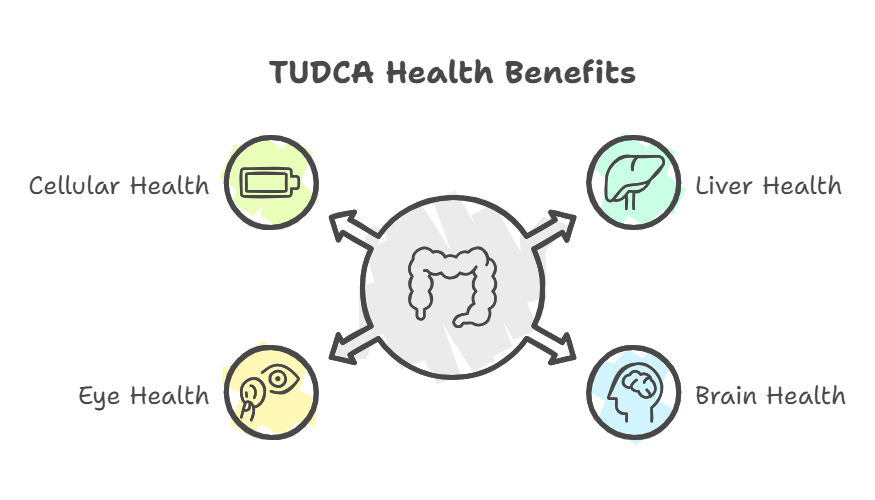Tudca (Tauroursodeoxycholic acid) is a powerful bile acid derivative making waves in the health and wellness industry.
Whether you’re looking to have a healthy liver function, manage blood sugar levels, or support overall cellular health, tudca might just be the supplement you need.
This guide dives deep into the benefit of tudca, exploring how it works on a cellular level, key tudca benefits for metabolic and liver health, and the growing body of research supporting its use.
“Tudca has been demonstrated to limit metabolic disturbances associated with obesity by inhibiting lipid accumulation, ER stress, inflammation, and apoptosis in adipocytes.”
Dr. David L. Byrne
From reducing ER stress to enhancing insulin sensitivity, tudca offers a range of potential health advantages backed by studies.
But that’s not all. We’ll also discuss how to incorporate tudca into your routine, covering recommended dosages, potential side effects, and tips for choosing a high-quality supplement.
Whether you’re new to tudca or considering it as part of your wellness regimen, this comprehensive guide has everything you need to make an informed decision.
What is TUDCA?
Tudca (tauroursodeoxycholic acid) is a bile acid. Our bodies naturally produce small amounts of it. Cholic acids are essential for digesting fat. They also act as signaling molecules, impacting various processes.
Tudca is hydrophilic (water-loving). This gives it distinctive properties compared to typical cholic acids. Because of this, there is benefit of tudca as treatment option for those who struggle digesting food, by adding extra bile to help with breaking down fats1.
The Benefit of Tudca: How Does it Work?
Tudca ( also known as Ursodeoxycholic acid) is a bile acid derivative with remarkable health benefits, primarily due to its impact on cellular mechanisms.
One significant benefit of tudca is its ability to protect the endoplasmic reticulum (ER), a vital organelle responsible for protein folding and cellular homeostasis.
When the ER experiences stress, the balance of protein folding is disrupted, leading to an accumulation of misfolded proteins—a condition known as ER stress.
Prolonged ER stress is linked to various diseases, including diabetes and neurodegenerative disorders. Tudca acts as a chemical chaperone, reducing ER stress by aiding in the proper folding of proteins and restoring cellular balance.
Another notable benefit of tudca is its impact on blood glucose regulation. Animal studies have demonstrated that tudca significantly lowers chemically-induced high blood sugar levels, highlighting its potential in managing metabolic conditions2.
In human trials, tudca improved insulin sensitivity by up to 30% in individuals with insulin resistance. This improvement stems from its dual action of reducing ER stress and restoring glucose homeostasis, making it a promising compound for glucose processing and insulin regulation.
Tudca’s influence on insulin function underscores its potential in treating metabolic disorders, especially those associated with high glucose levels and insulin resistance3.
Tudca’s influence extends to the gut microbiome, where it helps maintain a balanced microbial environment. Research suggests that bile acids, including tudca, act as signaling molecules that modulate the composition and activity of gut bacteria. A healthy gut microbiome is crucial for metabolic health, as it contributes to nutrient absorption, energy balance, and the production of short-chain fatty acids, which have anti-inflammatory properties.
As research continues, tudca is gaining attention as a therapeutic option worth exploring for multifaceted tudca benefits, ranging from cellular protection to metabolic health improvement.
Benefit of Tudca: A Deeper Look
Liver Support Tudca
Tudaca has a long history in traditional Chinese medicine for treating fatty liver desease and biliary disorders. Medical professionals recognized the benefit of tudca in aiding liver function.
Today, research confirms this potential. Studies show tudca’s ability to lower liver enzymes, which are indicators of liver health. Tudca may also reduce liver damage and support healthy bile flow.
This makes choosing best tudca supplement very helpful in treating liver cirrhosis and liver inflammation.
Brain Health
Emerging research reveals tudca’s neuroprotective abilities. Its unique capacity to cross the blood-brain barrier allows it direct access to the brain, positioning it as a promising option for potential tudca treatment for brain disorders.
Tudca influences critical brain pathways and may protect against neuronal death, which is a key factor in neurodegenerative diseases. For example, studies in Alzheimer’s disease mouse models have demonstrated tudca benefits to combat amyloid plaques, offering hope for future applications.
If you’re interested in understanding more about neurological health, check out our guide on unusual stroke symptoms to stay informed about critical warning signs.
Eye Health
Research illuminates tudca’s support for eye health, including retinal disorders. It seems to promote ocular cell function and preservation.
Some studies suggest it may even improve eyesight. However, research is ongoing. Definitive conclusions about tudca’s effectiveness for eye health are not yet available. More studies need to be conducted to definitively give an accurate benefit of tudca4.
Cellular Health
Studies show tudca supports mitochondrial and cellular health. Mitochondria are the energy hubs of our cells. Best tudca supplement may help maintain cellular vigor and improve energy output.
It protects cell survival by regulating apoptosis (programmed cell death). Tudca also has antioxidant effects, combating free radicals that can cause cellular damage.
If you’re looking for a simple and effective way to support your body in this area, I came across a supplement on Amazon that seems to do the job well. I’ve seen good feedback about it, and it might be worth considering as part of your daily routine. You can check TUDCA Bile Salts Liver Support Supplement out here.
Because of this there is tudca reduce in reactive oxygen species, thus mitigating damage to mitochondrial membrane and improving cellular health.

Tudca for liver has shown promise in preclinical studies using mouse models. Its use has shown potential benefit in reducing reactive oxygen species which aids in improved transcription factor function.
Side Effects of Tudca and How to Use it
Tudca, available in capsule form, is generally well-tolerated with no notable tudca side effects. Usual doses range from 250-1500 mg daily5.
This bile salt also possesses mild anti-inflammatory qualities. Tudca dosing above 1500 mg can cause mild digestive discomfort. These are transient and resolve quickly.
Some potential interactions with medications exist, potentially affecting absorption or counteracting with existing medicines. Do not take tudca if pregnant or using insulin. Please speak to your health professional and discuss possible side effects of tudca before supplementing.
Frequently Asked Questions
What is tudca good for?
One of key tudca benefits is its ability to support liver, reduce ER stress, and improve insulin sensitivity, supporting overall metabolic function. Tudca doesn’t “cleanse” the liver like detox teas. It supports liver function. It does this by protecting cell membranes and reducing stress in liver cells.
How to take tudca?
Take tudca with meals to improve absorption, typically in doses of 250–1,000 mg per day, as advised by your healthcare provider. Start with a lower dose and gradually increase if needed, splitting the tudca dosing throughout the day for better tolerance. Always consult a healthcare professional before use and avoid exceeding the recommended dosage.
How much tudca per day should I take?
Daily tudca use depends on individual health needs. Consult a healthcare professional for advice. tudca supports cell regeneration and reduces liver damage. Reversing fatty liver requires a broader treatment strategy. Tudca can help. It may reduce damage and enhance bile flow. Tudca is only one tool as part of that strategy. It should be an add-on treatment. The main goal is lifestyle changes.
Is tudca hard on the kidneys?
Research suggests tudca or chenodeoxycholic acid actually aids kidney function. It helps cells manage oxidative stress. It promotes cell integrity by aiding protein folding. This may slow cell destruction. One added benefit of tudca in mice was its potential to aid lipid metabolism in kidney tissues. It also showed some evidence of reduced blood pressure in obese mice. The full tudca benefits are not yet known.
Conclusion
Tauroursodeoxycholic Acid Benefits can have a positive impact on overall well-being. It may protect cells, support metabolism, and improve the brain. From aiding cellular processes to promoting homeostasis, the benefit of tudca is multifaceted.
Many results show efficacy in mouse models. But, we must test tudca in humans before using it instead of any prescription medicine.
This information is for educational purposes only. Always seek professional guidance for health concerns. A healthcare professional can help you decide on using tudca in your health regimen.
They can weigh its pros against its side effects of tudca and interactions, to benefit from tudca.
Small Step, Big Impact
To potentially enhance your liver and cellular health, consider incorporating tudca into your wellness routine after consulting with a healthcare professional to determine the appropriate dosage and ensure it aligns with your health goals.
Listen to this article
This is an AI generated Podcast version of the article.
- https://pmc.ncbi.nlm.nih.gov/articles/PMC6952947/[↩]
- https://www.mdpi.com/1422-0067/25/13/6922[↩]
- https://www.researchgate.net/figure/Effects-of-TUDCA-treatment-upon-glucose-tolerance-and-insulin-sensitivity-Blood-glucose_fig3_366555378[↩]
- https://journals.plos.org/plosone/article?id=10.1371/journal.pone.0024245[↩]
- https://bodybio.com/blogs/blog/what-is-tudca?srsltid=AfmBOooRI05HOJ4L5NWkyjnVYCMctXFk0pk34f3J4jy4–YsTCtXzZyd[↩]



